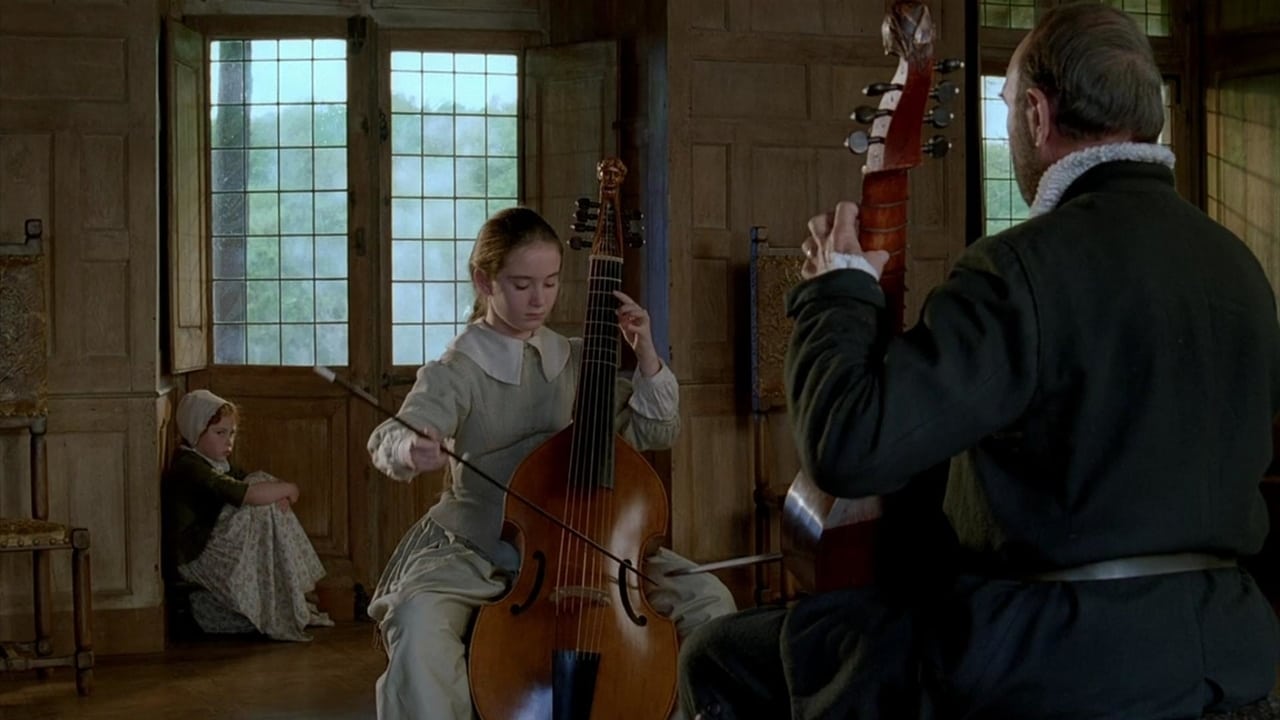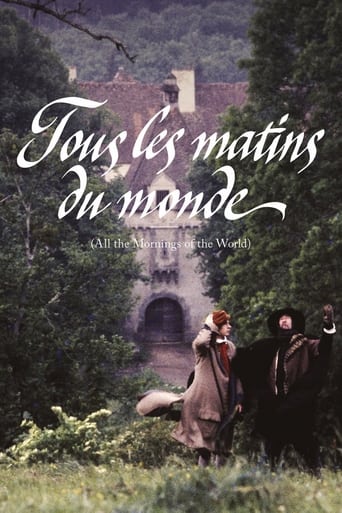Redwarmin
This movie is the proof that the world is becoming a sick and dumb place
Comwayon
A Disappointing Continuation
Teddie Blake
The movie turns out to be a little better than the average. Starting from a romantic formula often seen in the cinema, it ends in the most predictable (and somewhat bland) way.
MartinHafer
This film consists of the memories of the famous musician, Marin Marais (Gerard Depardieu), reminiscing about an even greater musician, Monsieur de Sainte Colombe. Now understand, these were real French musicians from the 17th and 18th century, but apparently very, very little is known about Colombe and the story is from a novel consisting of lots of conjecture by Pascal Quignard...so don't accept this as the gospel!Monsieur de Sainte Colombe (Jean-Pierre Marielle) is a very strange man--an angry weirdo, certainly. His wife died young and unexpectedly and his reaction is odd to say the least. He gave up his work and retreated to his shabby country home with his two young daughters. The home is a rather joyless place though he eventually taught his daughters to play the Viol de Gambon...a seven-stringed musical instrument popular during this era. Over time, they became brilliant at playing and they established quite the reputation...so much so that he is invited to court to play for King Louis XIV. But he is an oddball and so he steadfastly refuses...only playing a yearly concert for locals and otherwise living his simple life. Into this very mundane world comes a young Marin Marais (played here by Gerard's real life son, Guillaume). He begs Colombe to take him on as a student...something he never did before, aside from teaching his two daughters. And, briefly they work together though it ultimately ends in tragedy...and what that is you'll just have to see for yourself.If you are wanting to see a happy and uplifting movie, this is NOT for you. Much of the film is very somber and depressing, though the music is also quite lovely. However, it is well made though I am apprehensive to heartily recommend it for two reasons. First, it's not exactly a fun film and is incredibly somber...and some may now want to see such a movie. Second, the film does much to make Marais look like a total jerk...and is that hardly fair to the man's memory considering the story is essentially fiction??
Turfseer
Tous les matins du monde is the story of two musicians, Marin Marais (played by the noted actor, Gérard Depardieu) and his mentor, Monsieur de Sainte-Colombe, during the time of King Louis IV in the 17th century. The late director Alain Corneau adapted the novel of the same name, written by Pascal Quignard. Little is known historically of both Marais and Sainte-Colombe, and Quignard's novel is a speculative account of the two mens' relationship.The film begins with an elderly Marais (now the master player of the viola da gamba, a predecessor of the modern cello) recounting his youth as well as the biography of his mentor, Sainte-Colombe, who became a recluse on his country estate after the death of his wife. Sainte-Colombe did raise his two daughters, Madeline and Toinette, and taught them both how to play the viol, and the trio soon caught the ear of the king by performing local concerts. One of the members of the king's inner circle, Monsieur de Caignet, informs Sainte-Colombe that the king wants him to lead the royal orchestra at the court, but Sainte- Colombe refuses. For refusing the king, Sainte-Colombe and his daughters are banned from performing for the foreseeable future.Sainte-Colombe, who never got over the death of his wife, withdraws further into his own little world, spending hours in a diminutive hut (set off from his main house), where he further hones his craft on the viol. The central part of the drama begins when a 19 year old Marais (played by Depardieu's son, Guillame), shows up at Saint-Colombe's door, and begs him to take this unpolished son of a shoemaker on, as a pupil. As far as I could tell, Marais plays beautifully for Sainte-Colombe, but Sainte-Colombe, due to his unreasonable quest for perfection, is unimpressed. He perceives Marais as a sell-out, who will do well making music at the royal court, but will never be a bona fide, true "musician." Both daughters, nonetheless, are quite impressed by the young Marais and urge their father to reconsider taking him on as a pupil. Sainte-Colombe finally agrees to have the young man come back but after a short time he sends him packing. Marais ends up having an affair with Madeline, who teaches all her father's smart moves on the viol. And to top it off, Marais (along with Madeline), hides underneath the hut, in an attempt to appropriate more of the master's style. When Sainte-Colombe finds Marais underneath the hut, that's the last straw, and sends him packing for good.Marais is depicted as having been seduced by court life and coldly dumps Madeline. She becomes despondent and eventually hangs herself. Sainte-Colombe becomes even more despondent over his daughter's suicide, and it takes him months before he realizes that all that brooding has done him no good. This coincides with Marais' change of heart; he realizes the error of his ways—his seduction by King Louis IV's court—which also leads to an his own life-affirming epiphany, and the subsequent decision to call on Sainte-Colombe, leading to a reconciliation between the two 'great' men.In the end, Saint-Colombe ultimately realizes that the way he treated Marais was beneath him and simply arrogant. For a long while, he was obsessed with his dead wife, who he often saw in visions. He was brought back to reality by the crushing real-life death of his daughter. Similarly, just like in the case of his mentor, the death of someone close, was the catalyst for change. Marais realized that the way in which he treated Madeline, who he dumped for the seductive glare of the royal court, was awful and that he now needed to make amends. Marais could now approach his former mentor with humility and would now find an equally accepting and receptive Sainte-Colombe, ready to recognize his talents, which he was loathe to do, at an earlier juncture in Marais' career. The film's strongest suit is undoubtedly the rich visuals evoking the period as well as the music, performed by the modern day master of the viol, Jordi Savall. Corneau's screenplay is sometimes slow and wordy and manages to rely on narration a little too often. It's a simplistic tale of redemption, relying on the melodramatic deaths of two female characters, to effect a catharsis in both principals. Both Depardieus offer up convincing performances but it pains me to think about what happened to the younger Depardieu in real life (injured in a motorcycle accident, he eventually had to have his leg amputated; and later died of pneumonia at around age thirty). There's also the tragedy of director Corneau who died at the young age of 67 from cancer, not to mention the elder Depardieu's more recent troubles with the law.Had Corneau and Quignard had a few more real-life facts about Sainte-Colombe and Marais to go on, this could have been a slightly more nuanced tale. Instead, we're asked to assent to Sainte-Colombe's label as a 'genius', without any real evidence. The dour narcissist remains fixated on his dead wife for most of the film, and only comes out of his shell when faced with the second tragedy of his daughter's suicide. It's hard to believe that the real-life Marais would have placed his mentor on such a high pedestal. Historically, the quality of his musical output is deemed superior to the so-called master.Ultimately we must be content with the speculative character portraits proffered here. Tous les matins du monde is an extremely elegant film which features some great baroque music. Nonetheless, the melodramatic, invented tale of a conflict between master teacher and student, is not as believable or moving as the music, the narrative ably showcases.
Robert
Monsieur de Sainte Columbe is a cinematic staple: an Official Tortured Musical Genius, straight from central casting. His two virtues are that he's a master of the viol and its music, and that he's deeply distraught about his young, beautiful wife's untimely death. Those are the ONLY virtues he possesses. He's also the biggest ass in France; mistreating his young daughters, killing their pet beetle, telling the representatives of the King to go stuff himself for daring to praise him and invite him to play at court, deliberately smashing his pupil's priceless viol, and so on. His pupil's crime? "You're playing, but it's not *music*!" Sainte Columbe cries. And we're supposed to sympathize with him?! Making the l o n g viol-playing scenes more difficult to watch than they might be, Jean-Pierre Marielle, who portrays Sainte Columbe, is unfortunately utterly unconvincing as a viol player. His finger positions and movements on the fretboard in no way match the notes being played, nor does his bowing even roughly match the rhythm. Instead, he just gives us his patented Tortured Genius Face. And Guillaume Depardieu, as his young pupil is likewise unconvincing; acting more like a self-conscious teen heartthrob (tossing his long hair and flaring his nostrils) than acting with anything like subtlety. He also delivers one of the most groan-producing voice-over lines in cinematic history: "My thick prick hung between my legs". Yeah. Really. He did. I think at that point, the camera threw up in its mouth."Tout les Matins du Monde" is little more than a rehash of "Amadeus" (made 6 years earlier), right down to the contrite voice-over by the hack who stole the glory of the *real* musical genius, the uneasy relationship between court musician and king, the contrived romance and so on. Although "Amadeus" had its faults, its pacing and sparkling wit helped hide them. "Tout les Matins..." has no such savior. It plods along with one forced and implausible emotional scene after another. It does have some handsome locations and lovely baroque music, but in the end, it's simply not enough to save it from being irritating, predictable and ultimately, unengaging.
Imdbidia
A very original and interesting historic movie that tells the story of a famous French composer and cellist of the 17th century M. de Saint Colombe, who outcasts himself from the Court and society, refuses to play in public and teach anybody who is not his daughters, and lives simply with his three daughters in their countryside manor, devoted to a simple strict and almost ascetic life.The script is very good as analyzes the opposition between fame-quality in Art and in the personal life of an artist, and between music as a bunch of sounds and music as a piece of art. The personal stories of conquest and love are quintessentially 17th century, very charming and naughty on one hand, very fresh and naive on the other. The atmosphere of the movie is very good, and mixes well both bucolic and baroque elements typical of the art and life in that period.The acting is OK in their roles, although none of them shines especially. Moreover, the training of the actors to fake their playing of the instruments is poor, and you can see clearly that they are not playing. We all know that, but a little bit of more training in mimicking the play would have added credibility to those scenes, which, otherwise just look fake. The movie is very slow and unengaging at the beginning, but being a little patient pays off at the end.The movie is a little bit dull at times, but it has a good script, wonderful viola and cello music, and explores interesting concepts.

